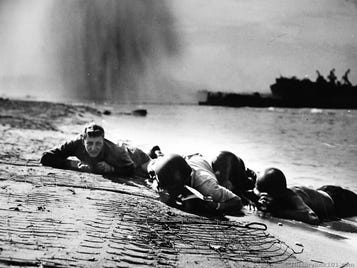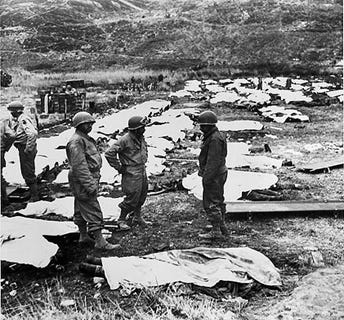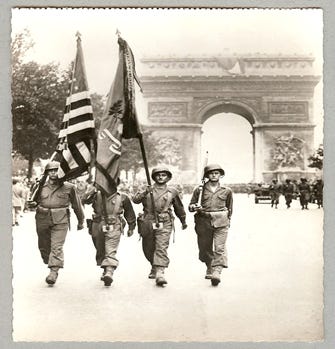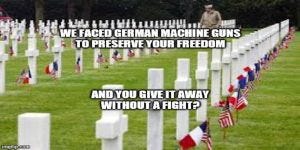Remembering D-Day, Or Not
June 6 is here, but do we recognize the significance of the day? How many of us pause to remember the heroism shown and the sacrifices made that day? As I write these words and you read them, we are enjoying one of the freedoms that those men fought to preserve, but are we aware of how fortunate we are?
Instead, we bicker among ourselves. We forget “E Pluribus Unum.” But 80 years ago, we knew what was important. We were engaged in mortal combat with German and Japanese tyrants. Our multi-racial, multi-ethnic armed forces were in the process of vanquishing the “pure races” of German Nazis and Japanese fascists.
On D-Day, June 6, 1944, the greatest amphibious assault in history occurred on the beaches of Normandy. Troops of the United States, the United Kingdom, and Canada invaded Nazi-held France. The liberation of Europe had begun.
Before the day ended, about 4414 Allied troops lay dead. About 2499 Americans died on those beaches that day. Of those who died, about 15% drowned. Their gear was so heavy that if they stumbled in the surf, they could not get up.
The cost was high, but back then we knew that freedom has a price. We knew that often we could pay the price in money or sweat, but sometimes we had to pay it in blood.
The issue remained in doubt for many hours. The Allied commander, Gen. Eisenhower, had prepared two speeches for delivery by radio. The speech he gave described the successful landing. The speech he didn’t have to give took the blame for the failure of the invasion.
But now, instead of our successes, the media dwell on abuse of enemy prisoners. Punishing the abusers shows we are moral people. But in all the time the war has gone on, have no Americans been decorated for bravery or other outstanding service?
Where are the photos of the 20 Medal of Honor recipients? Where are the photos of our people repairing water works, power plants, schools, and hospitals? Instead, photos and stories about Abu Ghraib prisoner abuse appeared on the front page of the New York Times for 32 consecutive days. If you don’t honor good deeds, you lose the right to criticize bad deeds.
And where are the photos of tortured American prisoners? Where are the photos of raped female prisoners? Where are the photos of dead American troops? Where are the photos of people who jumped from the Twin Towers on 9/11 to avoid being burned alive? If you close your eyes to wrongs done to us, you lose the right to focus on wrongs – or alleged wrongs – done by us.
During the World War II Battle of the Bulge, German SS troops massacred at least 86 captured Americans at Malmédy. After this, and after we began liberating concentration camps run by the SS, we took few SS prisoners. A typical order states, “No SS troops or paratroopers will be taken prisoners but will be shot on sight.”
It wasn’t “legal” to shoot surrendering SS men, but it was understandable. If you don’t act like a human being, you can’t expect to be treated like one. The media understood this. Unlike what is happening today, no civilian court tried to interfere with the conduct of the war by President Roosevelt, or with the treatment of prisoners by our armed forces.
When code breakers discovered that Japanese Admiral Yamamoto, the architect of Pearl Harbor, would be flying on an inspection tour, we shot down his plane. Unlike the killing of Bin Laden, the architect of 9/11, no one complained that Yamamoto should have been “arrested” and put on trial. No one was so removed from reality that he did not applaud the death of an effective enemy leader.
It’s been a long time since D-Day, June 6, 1944. Much remains the same, especially the chaos and danger of the battlefield. But much has changed in the attitude of the media, the courts, and the political opposition. This change has not been for the better.
As we look back to that day 80 years ago, we should reflect on the qualities that allowed us to achieve victory over tyranny. And we should do our best to rebuild those qualities, now that we need them again. But if we need a reminder of what those qualities are, we need only look at our multi-racial, multi-ethnic armed forces. They are role models for us all.
The images of D-Day were grim. But without D-Day, there would have been no joyous images of the liberation of Paris and the rest of Western Europe. Unless we are willing to sacrifice and if necessary to fight, we will be unable to give the gift of freedom to others, or even to keep it for ourselves and our children.
Critics often say, “It’s not your grandfathers’ war.” The real question is this: Are we like our grandfathers? Do we have the courage and resolve to face the economic and military challenges of our day as steadfastly as they faced the more severe challenges of their day? Time will tell. Today's young people need "safe spaces" at college, lest they hear dissenting ideas. There were no "safe spaces" on the beaches at Normandy.
Our grandparents reacted to President Roosevelt’s D-Day prayer by being inspired. On the contrary, how would we react if our President marked a solemn occasion with a deeply religious public prayer? Imagine the protests. Picture the scathing criticism. Think of the lawsuits by “civil rights” organizations.
Back then, the vast majority of Americans identified themselves as religious. But now, increasing numbers of Americans – and even more Europeans – list their religion as “none”. How can such people withstand an assault by radical, expansionist Islam? World War II cost America over 407,000 dead out of a total population of 133 million. Today, we would have to lose nearly a million dead to suffer proportional losses. Could we endure such losses and still persevere until the final victory? Does freedom mean as much to us now as it did then to our grandparents? I wonder.
●
Read Roosevelt’s beautiful prayer. Better still, listen to him read it. You will understand how much has changed in those 80 years – and not all for the better.







